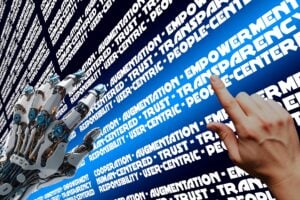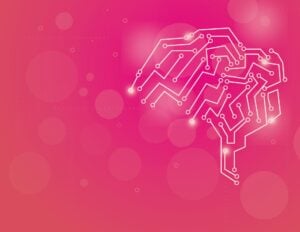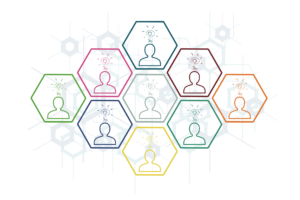The Benefits of Open Source
While large tech companies are rapidly investing in AI research and development, which has resulted in advances in the tool, issues around bias, accountability, security and transparency remain. This has led some to call for more open AI ecosystems.
As Ryo Sakai asserts in his blog on Medium, “The Democratization of AI: How Open Source is Fueling the AI Revolution,” it is the “open-source movement that aims to make AI more accessible by creating free, public resources and technologies. Proponents argue that open-source spurs innovation through collaboration while also building trust by showing how AI systems work under the hood. As AI becomes integrated into more aspects of our lives, ensuring it aligns with shared values becomes increasingly important.”
The benefits of open AI to innovation include more open partnerships, increased collaboration and communication as well more accelerated innovation and faster development cycles. Sakai observes, “The collaborative nature of open-source enables faster iteration and innovation. By working transparently, developers can build on top of existing tools and frameworks instead of reinventing the wheel. Open communities also attract diverse talent and produce more robust tools through large-scale peer review.”
Promoting fairness and accountability, building trust, and expanding accessibility can also enable startups and small businesses to tackle more innovation tasks through open AI sources. Certainly, there are still challenges that remain, such as security issues, copyrighted materials, and the protection of intellectual property. Ease of use can also still be a challenge, as some training might still be required for a non-technical person to use these tools. But Sakai argues that nonprofits, government agencies and universities may benefit the most from democratizing AI. An intriguing question could be whether private enterprises could also have potential success in leveraging open-source AI.
The Open Road
All Things Innovation’s “Embracing Open Innovation” looked at how open innovation is a growing tactic for today’s globalized enterprises. Rather than focusing just on closed loop systems and internal sources, such as their own research and development department, open innovation is a collaborative approach with those outside the company and a way to find key external resources to foster innovative thinking and practices. This calls for the innovation team to broaden their reach through open tactics and collaborative approaches, rather than closed strategies, to bring open and resilient innovation to the table as an important management tool.
Looking forward to FEI 2024? The conference, which will be held June 10 to 12, will feature Gen AI roundtable sessions. The Gen AI roundtables are plenary sessions where the audience will be providing AI use cases that are real, either within an organization, team based or simply based on a personal executive’s remit. FEI will populate hundreds of real time Gen AI use cases within this session in an anonymized fashion, so who shares what at the roundtable remains anonymous. The key takeaways will be populated into a post-show report, where you’ll see hundreds of Gen AI use cases. Register for FEI 2024 here.
Encouraging Innovation
The agile democratization of AI can significantly benefit innovation across various industries. We asked ChatGPT for several ways in which this approach can contribute to fostering innovation:
- Faster Prototyping and Iteration: Agile methodologies, combined with the democratization of AI, enable faster prototyping and iteration of AI-powered solutions. This speed facilitates a more dynamic and responsive development process, allowing teams to experiment with different AI models and algorithms to find the most effective and innovative solutions.
- Cross-Functional Collaboration: By democratizing AI, organizations can involve individuals from various departments and skill sets in the AI development process. This cross-functional collaboration enhances creativity and brings diverse perspectives to problem-solving, leading to more innovative AI applications that address a broader range of business challenges.
- Empowering Non-Technical Teams: Democratizing AI makes AI tools more accessible to individuals with non-technical backgrounds. This empowerment of non-technical teams, such as marketing, sales, and customer support, allows them to explore innovative use cases and implement AI solutions in their respective domains without heavy reliance on data scientists or developers.
- Rapid Experimentation and Learning: Agile practices coupled with AI democratization encourage a culture of experimentation. Teams can rapidly test hypotheses, gather insights, and learn from failures, fostering a continuous improvement mindset. This iterative approach accelerates the innovation cycle, leading to more effective AI implementations.
- Enhanced Problem-Solving: The democratization of AI enables a broader range of professionals to engage in problem-solving using AI tools. This access allows individuals to apply AI to unique challenges in their domains, leading to innovative solutions that might not have been apparent within a more constrained development environment.
- Increased Innovation Diversity: With a more diverse group of contributors participating in AI projects, there’s a greater likelihood of diverse perspectives and ideas. This diversity contributes to a richer pool of innovative solutions and applications, fostering a more inclusive and comprehensive approach to leveraging AI for various business purposes.
- Flexibility in AI Implementation: Agile democratization allows for flexibility in how AI is implemented within an organization. This adaptability enables businesses to experiment with different AI models, algorithms, and deployment strategies, leading to the discovery of novel approaches and innovative applications.
- Improved Time-to-Market: The agile democratization of AI streamlines the development process, reducing bottlenecks and improving time-to-market for AI solutions. This accelerated timeline enhances the organization’s ability to stay ahead in a rapidly changing business landscape.
- Data-Driven Decision-Making: The combination of agile practices and democratized AI empowers organizations to make more informed, data-driven decisions. This data-centric approach enables better identification of market opportunities, customer needs, and areas for improvement, contributing to more innovative and targeted business strategies.
- Scalability and Accessibility: Democratizing AI makes AI capabilities more scalable and accessible across different teams and departments within an organization. This scalability allows for broader innovation initiatives, making it possible for diverse teams to leverage AI for various purposes without overwhelming resource constraints.
Empowering Organizations
The agile democratization of AI promotes a collaborative and adaptable environment that accelerates innovation by empowering diverse teams, fostering experimentation, and enhancing problem-solving capabilities across different domains within an organization. Just how open-source approaches to AI, or open innovation methods, would play a role is still a work in progress, and might depend on the needs of the company.
But as Sakai writes, “The open-source approach provides a compelling model for AI development that promotes transparency while accelerating innovation. By making knowledge and technologies freely accessible, we can bring the benefits of AI to society more quickly and equitably.”
Video courtesy of Future of AI & Data
Contributor
-

Matthew Kramer is the Digital Editor for All Things Insights & All Things Innovation. He has over 20 years of experience working in publishing and media companies, on a variety of business-to-business publications, websites and trade shows.
View all posts
































































































